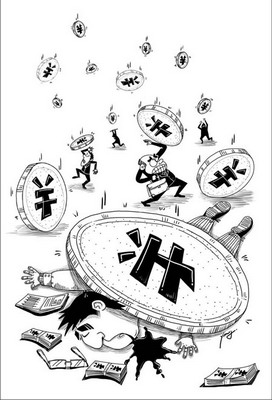Are the rich more prone to suicide?
Updated: 2011-09-30 13:44
By Patrick Mattimore (China Daily)
|
|||||||||||
|
 Wang Xiaoying / China Daily |
A recent China Daily cover story reported a study implying that the rich are more prone to committing suicide than the poor. The story continued on page 6, where it was headlined: "Suicide: Wealth leaves many unhappy".
None of the story's first four anecdotes provide evidence for that unwarranted conclusion. The first anecdote is a story about a man who attempted suicide after he lost his money, which suggests that, had he made money on his investment, he would not have attempted suicide.
The second and third cases are about rich people who were murdered. The fourth bit of non-supporting evidence is the case of a rich man who died from natural (cancer) causes.
The report then quoted a "physiological counselor", whatever that is, who claimed that "extreme depression and powerlessness felt by many rich people cause them to lose faith in life".
As much as we might want to believe that money is the root of all evils and that too much of it would spoil us, researchers tell us that it just ain't so.
Psychologist David Myers has researched the question as to whether rich people are happier. Citing various research, Myers has said that in poor countries, being relatively well off does make for greater well-being.
The facts about income and happiness turn out to be much simpler than first realized according to researchers Justin Wolfers and Betsey Stevenson. They concluded that:
1) Rich people are happier than poor people.
2) Richer countries are happier than poorer countries.
3) As countries get richer, they tend to get happier.
What may be true is that the correlation between income and happiness gets weaker in wealthier countries. Where nearly everyone can afford life's necessities, increasing affluence matters little.
Also, having more than enough, may not be much better than having just enough.
In a 16-nation study covering 170,000 people, University of Michigan researcher Ronald Inglehart observed that, once comfortable, more money provides diminishing returns. In other words, the second piece of chocolate, or the second $100,000, never tastes as good as the first.
But what about the link between the rich and suicide? Does it exist? Apparently not.
A 2003 study in the Journal of American Psychiatry, based on a study of suicides in Denmark over a 16-year period, found that one suicide predictor was being in the lowest income quartile.
According to World Health Organization statistics, China has a medium suicide rate relative to other countries, about 13.9 per 100,000 people. The global rate is 16 (2009). Other researchers dispute that, suggesting China's rate of suicide is underreported, particularly in rural areas where those rates may be three to four times higher than in the cities. (Herbert Hendin, Lakshmi Vijayakumar, Jose M. Bertolote, Hong Wang, Michael R. Phillips, Jane Pirkis put China's rate at slightly over 20 per 100,000). Commentator Jeff Hays says the rate is 23 per 100,000.
Regardless of the country's overall rate, the fact that suicides are much higher in rural (poorer) areas would suggest that wealth, or at least moderate wealth, is a buffer against suicide in China.
Unfortunately, this "rich commit suicides" story is a lot like the Foxconn suicide factory stories that the media spread last year. It turned out that Foxconn actually had a proportionately lower rate of suicide than the population at large, just like the rich.
The author teaches American law courses in China through a masters program jointly sponsored by Tsinghua University and Temple University, and is a fellow at the US-based Institute for Analytic Journalism.













